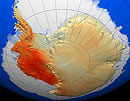Contrary to earlier studies showing that Antarctica was bucking the global warming trend and cooling slightly, a major new study has found that most of the continent — and particularly its western half —Nature. has warmed substantially over the last 50 years. Scientists from NASA, the University of Washington, and other agencies used infrared temperature measurements from satellites and data from ground stations to determine that the continent overall warmed by .6 C (1 F) from 1957 to 2006 ”“ about the same as the southern hemisphere as a whole. In west Antarctica, where eight marine ice shelves have collapsed in recent decades and massive ice sheets are showing signs of instability, temperatures have risen by .85 C (1.5 F) in the past 50 years, according to the study, published in Temperatures on the Antarctic Peninsula have risen several times as fast as west Antarctica as a whole. The new study says that some parts of east Antarctica have actually cooled slightly due to changes in wind circulation that are driving more cold polar air over those regions. The recent study underscores concerns among scientists about the warming of the west Antarctic ice sheet, which, if it were to melt in its entirety, could raise global sea levels by 16 to 20 feet.
Antarctica Warms Significantly,According to Comprehensive New Study
More From E360
-
WATER
After Ruining a Treasured Water Resource, Iran Is Drying Up
-
FILM
At a Marine Field Station, Rising Seas Force an Inevitable Retreat
-
Energy
To Feed Data Centers, Pennsylvania Faces a New Fracking Surge
-
SPACE
Scientists Warn of Emissions Risks from the Surge in Satellites
-
WILDLIFE
A Troubling Rise in the Grisly Trade of a Spectacular African Bird
-
MINING
In Myanmar, Illicit Rare Earth Mining Is Taking a Heavy Toll
-
INTERVIEW
How Batteries, Not Natural Gas, Can Power the Data Center Boom
-
ANALYSIS
As U.S. and E.U. Retreat on Climate, China Takes the Leadership Role
-
Solutions
From Ruins to Reuse: How Ukrainians Are Repurposing War Waste
-
ANALYSIS
Carbon Offsets Are Failing. Can a New Plan Save the Rainforests?
-
Energy
Facing a Hostile Administration, U.S. Offshore Wind Is in Retreat
-
Biodiversity
As Jaguars Recover, Will the Border Wall Block Their U.S. Return?
